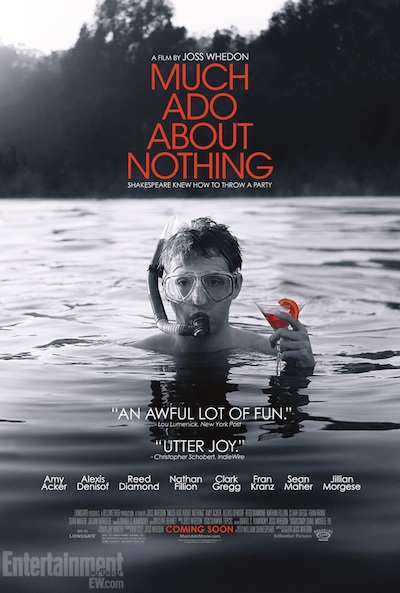 I fantasize about getting drunk with Joss Whedon and reading Shakespeare.
I fantasize about getting drunk with Joss Whedon and reading Shakespeare.
I realize the brashness of this statement is slightly jarring, but this is the honest truth. Ever since my little, Whedon-obsessed brain first read that Joss would, on occasion, invite cast members of Buffy to his home for informal Shakespeare reading shindigs, I have desperately wished to bear witness to one of these epically artistic and bacchanalian (perhaps only in my mind) events. Whedon’s latest release, a modernized, black-and-white film take on William Shakespeare’s Much Ado About Nothing, might be nothing more than a single, concentrated drop of the joyous nectar that is a Whedon Shakespeare reading, but that “single drop” is still one of the most elegant, charming, hilarious, and, of course, romantic films of the year.
Shakespeare’s Much Ado About Nothing is one of his most well-known comedies and focuses on the romantic pursuits of two separate couples, the young and eager Claudio and Hero, and the witty and prideful Benedick and Beatrice. While Claudio and Hero follow their hearts and are naturally drawn to each other, Benedick and Beatrice wage a “merry war” with one another, tossing clever barbs at one another to cover the subconscious passion between them. When both Benedick and Beatrice rail against love and state they will never marry in front of their friends, a plan is concocted to fool the antagonistic pair into admitting their feelings for each other and tying the knot. As with most Shakespeare comedies (and Whedon comedies, for that matter), wackiness ensues, courtesy of some despicable knaves, almost preventing the union of fair Claudio and Hero, but, in the end, love conquers all (as it should).
Whedon’s take on Much Ado About Nothing is nothing less than stellar. First off, as someone with a stage theatre background, it always delights me to see a film adaptation of any of The Bard’s classic plays, as it often provides an opportunity for those unfamiliar with these amazing stories to experience Shakespeare’s work unhindered by the normal stereotypes of the genre, and Whedon’s Much Ado is perfect for this task. The actors handle the text effortlessly, easily conveying important plot points and emotional arcs, and mastering the script in a way that makes the heightened language easy on the untrained ear. With Much Ado, the Avengers director proves, once again, that despite his knack for the epic and action-packed, his love of character-driven drama and humor is where his true storytelling powers lie. Whedon’s Much Ado About Nothing is incredibly funny, excitingly passionate, and, most importantly, intimately sincere. Filmed in Whedon’s Santa Monica home during a 12-day “break” from Avengers and cast and crewed almost solely with family, friends, and Whedon alum from his various projects, Much Ado feels incredibly naturalistic, personal, and genuine. Whedon achieves a miracle with this film’s charm that makes it feel more like a long weekend with old friends than a cinematic story, daring the audience to not smile at the abundance of love (both romantic and platonic) displayed on screen and practically guaranteeing that the audience will leave with that mixture of warm satisfaction and bittersweet longing that is usually reserved for the heartfelt goodbyes that accompany the last day of a cherished holiday gathering with loved ones.
I know that I’ve already touched on the amazing cast, but there is some superb talent in this film. For Whedon fanatics especially, the cast is basically the Jossian equiavelent of The Expendables, assembling Whedon fan-favorites like never before and reading almost like a “who’s who” list of actors who’ve been cast previously by the director. Clark Gregg (Agent Coulson in Whedon’s Avengers) is phenomenal as Leonato, playing the role with a zest and enjoyment that is impossibly contagious. Fran Kranz (stoner hero Marty from Whedon’s The Cabin in the Woods) continues to surprise with his versatility as an actor in his performance as Claudio (the saddest boy to ever hold a martini – yeah, that’s an inside joke for all the Vanilla Sky fans in the room) and shares some real chemistry with his beloved Hero, played by the delightful Jillian Morgese. Nathan Fillion (Firefly) and Tom Lenk (Buffy the Vampire Slayer) steal their scenes as the hilarious security staff, Dogberry and Verges, and Sean Maher (Simon Tam in Firefly) relishes his chance to play the villain, proving that even evil likes cupcakes. Appropriately, the two shining stars of the film are Alexis Denisof (former watcher Wesley of Buffy and Angel) and Amy Acker (science buff Fred from Angel) as Benedick and Beatrice. Both actors bring their A-game to these roles, delivering flawlessly endearing performances that showcase both of their amazing talents (including Denisof’s hilarious physical comedy skills). One can only hope that Hollywood is paying attention and starts casting Acker and Denisof in the more prominent cinematic roles that they certainly deserve, given their abilities.
Still, there was one flaw with the film. I was severely disappointed by the lack of a post-credits scene featuring either shawarma or Samuel L. Jackson. It’s a true shame and a horribly missed opportunity.
5 Wine-laced Shakespeare Performances out of 5
Joss Whedon’s Much Ado About Nothing will be in theaters starting on June 7th. You can find out more about the film at the official website.

